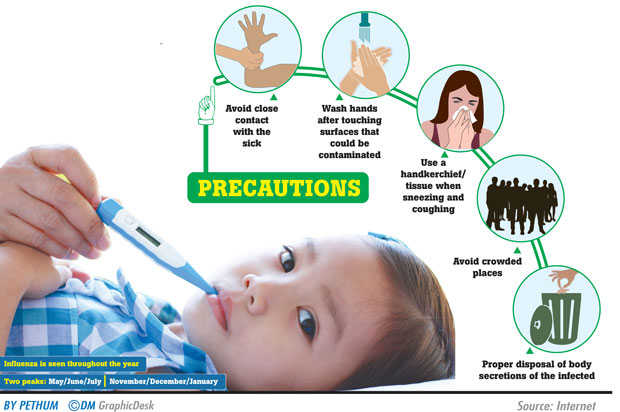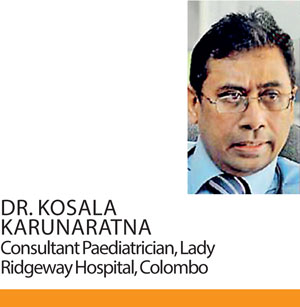24 Nov 2017 - {{hitsCtrl.values.hits}}

 It’s quite common for people to contract influenza throughout the year. But there are particular times of the year when there is an increase in the spread of the disease. Influenza spread rises during the months of November, December and January. This is the time of the year when the onset of seasonal influenza commences. So it’s important that we protect ourselves against it. Dr. Kosala Karunaratna, Consultant Paediatrician, Lady Ridgeway Hospital, Colombo, addresses the issue of influenza in this week’s issue of Health Capsule. He provides advice on how the public can take precautions to prevent ending up having to sneeze and cough. Influenza is a health issue that can be cured with medication and rest. But when the condition is prolonged and left untreated for a long period of time, influenza can lead to bigger problems.
It’s quite common for people to contract influenza throughout the year. But there are particular times of the year when there is an increase in the spread of the disease. Influenza spread rises during the months of November, December and January. This is the time of the year when the onset of seasonal influenza commences. So it’s important that we protect ourselves against it. Dr. Kosala Karunaratna, Consultant Paediatrician, Lady Ridgeway Hospital, Colombo, addresses the issue of influenza in this week’s issue of Health Capsule. He provides advice on how the public can take precautions to prevent ending up having to sneeze and cough. Influenza is a health issue that can be cured with medication and rest. But when the condition is prolonged and left untreated for a long period of time, influenza can lead to bigger problems.
Blame it on the viruses 
Viruses are the causative factor for influenza. “There are many types of influenza viruses. The most common are viruses A and B. Type A influenza can give rise to severe complications of the disease. Pneumonia is one such complication. H1N1 and Bird Flu are some examples of influenza due to Type A virus. Patients suffering from other diseases, when fallen prey to influenza, may face complications. Much of the influenza that spreads in the country is caused by Type A viruses. Influenza spreads very easily and rapidly. They can develop into epidemics. The reason for this is that these viruses undergo mutations and evolves easily. Influenza caused by Type B usually doesn’t develop into severe complications,” explained Dr. Karunaratna.
Antibiotics are of no use in the treatment of influenza as it is caused by a virus. Antibiotics may even be harmful. Unnecessary use of antibiotics will destroy the body’s good bacteria which form a part of the body’s natural defence system. This leads to a secondary bacterial infection by making way for harmful bacteria that could cause other diseases. “For example consider that there is a viral infection in the lungs. The good bacteria provide protection against harmful microbes that enter the body. Antibiotics have no effect against viruses. So when antibiotics are taken meaninglessly, it will adversely affect the body’s natural bacteria. This makes way for more harmful microbes to cause disease in the body, complicating the previous malady. This secondary bacterial infection can be severe,” the Paediatrician explained further.
Being in the extreme of ages both young children and the elderly population can fall victim to influenza and develop complications.
High fever, coughing, runny noses and sore throats are the infamous symptoms of influenza. Dr. Karunaratna stated that general treatment for influenza includes taking your meals on time and paying attention to the quality of nutrition in food. “When having fever fluids are easily lost from the body through the skin; and even by sneezing. Dehydration can worsen symptoms. Therefore hydrate the body by constantly drinking water and other fluids. Not exerting yourself and plenty of bed rest will help you feel better,” advised Dr. Karunaratna. Influenza can rarely be followed by symptoms like diarrhoea.
Prevention is the best policy
“Influenza is a malady that affects the respiratory tract. Pneumonia is the infection of the lungs. Viral influenza can lead to viral pneumonia. When influenza reaches a severe state, antiviral drugs would be prescribed. They are mainly used in treatment in government hospitals under the recommendation of a doctor. Severe cases of influenza where the condition has become complicated calls for tests to confirm the type of influenza virus that has infected the patient. A nasopharyngeal swab or a nasopharyngeal aspirate Test will be conducted upon the consultation of a specialist to identify the type of virus behind the infection. Vaccines against influenza and pneumonia are used in the treatment as well,” stressed Dr. Karunaratna.

 Influenza is a disease that can be cured if treated on time. Complications are consequential if left untreated. Since this is the season for influenza, you are more likely to be susceptible to the disease. So the best way to avoid all the medical hassle is by taking preventive measures to protect yourself against the disease. As influenza spreads rapidly and easily, attention has to be paid to prevent any way in which the disease can spread. “When you sneeze, millions of droplets spread in the air. This can infect other people easily, especially in crowded places. Covering up your nose when sneezing is important to prevent the influenza from spreading. It also spreads through the hands. Therefore hand hygiene is essential. Avoiding crowded areas can help reduce the risk of infection. There are vaccines available to treat influenza as well as pneumonia,” Dr. Karunaratna said. He further added that most people are unaware of the availability of vaccines for influenza and pneumonia. “Children up to the age of 5 should definitely obtain the pneumococcal vaccine. It is an important yet neglected fact,” he accentuated. Other preventive measures include having nutritious meals and maintaining hydration.
Influenza is a disease that can be cured if treated on time. Complications are consequential if left untreated. Since this is the season for influenza, you are more likely to be susceptible to the disease. So the best way to avoid all the medical hassle is by taking preventive measures to protect yourself against the disease. As influenza spreads rapidly and easily, attention has to be paid to prevent any way in which the disease can spread. “When you sneeze, millions of droplets spread in the air. This can infect other people easily, especially in crowded places. Covering up your nose when sneezing is important to prevent the influenza from spreading. It also spreads through the hands. Therefore hand hygiene is essential. Avoiding crowded areas can help reduce the risk of infection. There are vaccines available to treat influenza as well as pneumonia,” Dr. Karunaratna said. He further added that most people are unaware of the availability of vaccines for influenza and pneumonia. “Children up to the age of 5 should definitely obtain the pneumococcal vaccine. It is an important yet neglected fact,” he accentuated. Other preventive measures include having nutritious meals and maintaining hydration.
23 Dec 2024 1 hours ago
23 Dec 2024 2 hours ago
23 Dec 2024 2 hours ago
23 Dec 2024 3 hours ago
23 Dec 2024 4 hours ago